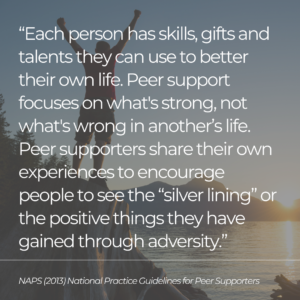Peer Support is an extremely effective and evidence-based mental health service that uses a person’s lived experience to help others in their recovery. This blog is part of our new yearlong series, where each month we will take a deeper look at what it means to work as a Peer Support Specialist and how to adhere to the 12 ethical guidelines created by the National Association of Peer Supporters (NAPS).
For this blog, we will be focusing on the guideline that states peer support is strengths focused.
 Why is this guideline important?
Why is this guideline important?
Each and every person has skills or strengths. However, not everyone knows of the strengths they possess, and it can be especially difficult to feel like they are present when going through a difficult time. While it may not be intentional, we may receive messages that make us feel like we cannot rely on ourselves during times of hardship.
A person is not going to try and lift an obstacle in front of them if they don’t believe they have the strength to do so. However, by pointing out the strengths and skills you see in them, you can significantly increase their chances of attempting and succeeding at moving the rock in front of them. This holds true for recovery as well.
Lisa Pattoni explores the effectiveness of this value in her article “Strengths-based approaches for working with individuals”.
“Strengths-based approaches value the capacity, skills, knowledge, connections and potential in individuals…. Strengths-based approaches concentrate on the inherent strengths of individuals, families, groups and organizations, deploying personal strengths to aid recovery and empowerment.”
The article continues to point out that adopting strengths-based approaches will eventually lead to supporting others in developing their independence, resilience, and solution-oriented problem solving. This is yet another way Peer Support Specialists can assist others in building up their own personal toolbox to achieve their wellness and recovery goals.
What does this look like in practice?
There seems to be a tendency for health care professionals to simply focus on whatever a person’s condition is or the struggles that can sometimes surround it. While these kind of discussions and focus can serve a helpful purpose, they should not be the sole focus of everyone who tries to support them, especially Peer Support Specialists.
If a person you are working with wants to talk about the struggles they are facing, it is okay to continue that discussion with them if that is what they need in the present moment. Whatever support you provide for people should remain person-driven, and if they feel they need someone to just be present for them then that is a great way to support them. Along with that, Peer Support Specialists can also look for opportunities to mindfully be aware of the strengths the person is demonstrating as well. Simply pointing out those skills during those challenges can be a simple and effective way of using a strengths-based perspective. Even the fact that the person is working with you to receive peer support is an incredible strength and could simply be recognized by stating “Hey, you are here!”
Acknowledge what is important and help them reframe what they are doing to take care of themselves. For example, if they feel they have really struggled with getting out of bed some days, you could take the opportunity to point out how they have kept themselves safe despite feeling uncertain or overwhelmed. Far too often society or individuals will mislabel strengths and positive coping mechanisms, so it is important for Peer Support Specialists to help them reframe those.
How to use this guideline moving forward
Even in the midst of challenging situations and the negative feelings surrounding them, individuals are often exhibiting strengths if we take the time to focus on them. Peer Support Specialists can use these opportunities to identify the strengths they are seeing. Over time, individuals will learn how to identify those strengths on their own, and they may find themselves focusing more on their strengths on their own. This will also help foster resilience, as over time they feel more prepared and well equipped to face challenges that may arise in the future.
